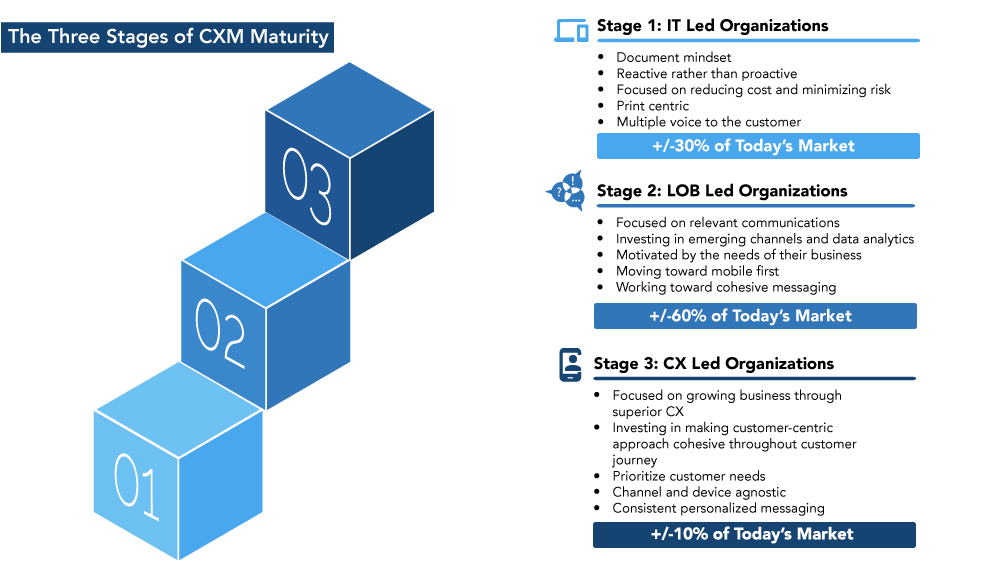As consumer expectations around instant access to timely, relevant information continue to rise, the customer communications industry is evolving to meet them. For this reason, customer communications management (CCM) has evolved rapidly in the last few years, to a new, omni-channel reality.
Where customer communications used to involve static, one-way messaging, today’s communication solutions can help organizations realize the promise of true, scaleable, omnichannel customer interactions based on deep analytics.
But not all businesses have completed the evolution to mature CXM (Customer Experience Management). Where does your organization, and its customer communication strategy, fall on the following spectrum?

1. IT-Lead Customer Communications
In the least mature organizations, which represent 30% of the companies surveyed in recent research by Aspire, IT continues to make customer communication decisions. These businesses retain a document-centric perspective and invest in CCM only when backed into a corner by regulatory changes or equipment failures.
CCM advancements at this lowest maturity level tend to be tactical rather than strategic. For example, IT led organizations might expend energy and capital in a push toward digital migration, but those efforts will be short-sighted, designed to meet concrete (but limited) goals or an evolving regulatory requirement.
You might be in this stage of CXM maturity if:
- Your communications are limited to those required by law
- You have a print-centric approach, with limited and rudimentary online communications
- Communications with your customers are fragmented or even contradictory (i.e. mortgage ads sent to your current mortgage holders)
2. Line-of-Business (LOB)-Lead Communications
The 60% of businesses that find themselves in the middle of their transformation have handed over customer communications ownership to line-of-business (LOB) users and entered the second stage of CXM maturity. Investments in this middle stage are focused on securing the agility and adaptability necessary to achieve the fastest time to market through a customer’s preferred communication channel.
While cost reduction remains important as a means to fund these new initiatives, the primary goal is higher customer satisfaction. Problems arise, however, when businesses approach this goal with an insular perspective that does not account for actual, real world consumer demand.
For example, a healthcare provider might go to great expense to set up a mobile app without considering the reluctance of their older customer base to download the app or conduct sensitive business through it. On an even more fundamental level, while empowering the LOB does help organizations increase business value, internal siloes often remain in place and restrict them from becoming fully customer centric.
Your organization might be in phase two of CXM maturation if:
- You have some limited personalization of messaging and channel
- You are working towards timely communications, but sometimes miss the mark
- Your communications are data-driven, but you have the sense you could be doing more with customer analytics
3. CX-Lead Customer Interactions
In the third and final stage of maturity, true converts to CXM prioritize customer experience through superior data analytics and journey insights. Every communication is scrutinized to ensure it is relevant, consistent with the consumer’s place on their customer journey, and calibrated to deliver maximum lifetime value.
Aspire’s recent CXM research found that only around 10% of businesses worldwide have achieved this level of CXM maturity. Going forward, these businesses will begin to adopt a perspective that looks from the outside in, allowing actual consumer needs to shape their communications and placing control in the hands of centralized CX teams, who can direct a cohesive strategy reaching consumers at every point along their journey.
As a mature CXM-led organization:
- Your communications are deeply personal, timely, and relevant, because they are based on rich customer insights
- All customer communications are part of a multi-step, holistic customer communication strategy
- Messages reach customers through their preferred channel or device, and you have an eye on emerging channels and evolving preferences
Accelerate Your CXM Evolution
Savvy investment is a vital component of the journey to CXM maturity, but an organization cannot spend its way to success. Since customer experience is the sum total of all interactions during the entire lifecycle, true change cannot be achieved just by evolving technology to fully understand customer behavior and secure the ability to interact in a channel and device agnostic way.
Real transformation also requires organizational changes to overcome functional silos and improve coordination and collaboration between business units, as well as developing more agile and automated workflows and processes. These transformations can be complex, but the rewards are significant, with CX-focused businesses bringing in 5.7 times the revenue of their less customer-obsessed peers, according to Forrester Research.
To evaluate your readiness to provide CX-focused customer communications, and to understand your next steps towards CXM maturity, download Aspire’s recent analyst whitepaper, “CXM Transformation: How Establishing a Single Source of Truth Can Help Businesses Build a Consolidated Communications Strategy”








